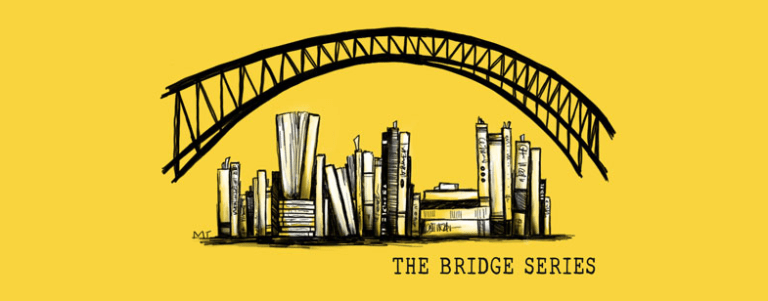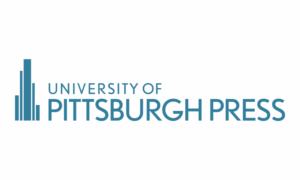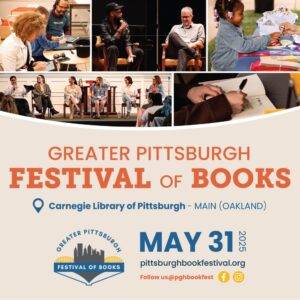The Bridge Series is a new series uniting the Pittsburgh literary and activist communities to raise awareness and funds for local organizations fighting the good fight in these troubling times.
The series convenes the last Wednesday of each month at Brillobox and each installment will feature Pittsburgh’s finest writers and a special guest organization, with proceeds from the evening going directly to that organization.
Littsburgh recently caught up with the founders of The Bridge Series, Kristofer Collins and Jason Baldinger, to talk about literary activism and the inspiration for The Bridge Series.
What’s your inspiration for the series?
Jason: With the discouraging results of this past election, I, personally, didn’t feel like I could sit back any longer and not be an active participant in a democracy that seems to be failing. I was depressed the following day, as many of us were, but as the the labor activist Joe Hill said “Don’t Mourn, Organize.” The idea for the series came from that concept as Kris and I texted the day after, brainstorming on ways we could resist in the age of Trump.
Kris: The day after the election my wife and I were drowning our sorrows at Roundabout in Lawrenceville. At the tables around us everyone seemed to be in as much shock as we were. Everyone was talking about what had just happened and worrying about what was going to happen now with Trump in the White House. I felt like a line had been crossed and I was telling my wife I didn’t think I could do readings anymore unless they were about something more than simply celebrating art for art’s sake. At the same time Jason and I were trading “What now?” texts. I told him my concerns about the inadequacy of poetry in our new reality. That’s when Jason suggested maybe we should start a new kind of reading series.
What do you hope to accomplish with this series?
Jason: I think Pittsburgh already has a strong and supportive writing community, but in this version of America, community will be the most important thing. Also, much in the same way as the election mobilized me to want to do more, I realize as I look around the writing community I see echoes mostly of myself (white, college educated, working poor middle class men and women) and it seemed clear that as writers we needed to do a better job of incorporating a more diverse group of writers into that family and equally important offering safe spaces where anyone who doesn’t fit the echo chamber I’ve (we’ve) created. I guess more simply there are a lot of conversations that aren’t taking place in America whether they involve race, gender, sexuality, etc., I want to be involved in those conversations without directing them, I want those conversations to find ways to be applied to a make a more equitable society.
Kris: From our first conversation about the new series I made it very clear that I did not want to run this the way I ran TNY Presents. Jason and I were on the same page from the start and we quickly decided that if The Bridge Series was going to work it could not just be the two of us developing it. Pittsburgh is full-to-the-brim right now with excellent reading series, so if The Bridge Series wasn’t going to be a different animal then there was no point in doing it. First we determined that the priority of the series would be the merging of the literary and activist communities. Each installment would feature one local or national organization that was engaged in helping the marginalized members of the Pittsburgh community. That organization would, in fact, share the stage with the writers. And proceeds from the evening would then be donated to that organization. We want to create an equivalency between art and activism.
The second thing we knew we had to do was create an advisory board to help steer and curate the series. It’s vital to The Bridge Series to bring writers together who do not often share a stage, blending those voices, celebrating a diversity of experience. To do this effectively required that The Bridge Series run as a collective. Jason and I are there to facilitate the day-to-day business of the series, but the advisory board is the soul of the thing. To that end we were so very lucky to have come aboard the series Joan Bauer, Deesha Philyaw, Michael Simms, Adriana Ramirez, Meghan Tutolo, Ellen McGrath Smith, Jen Ashburn, and Deena November.
Working collectively we hope to present a unique experience to the audience. As Jason said the series itself is really this ongoing conversation. It’s less a presentation of discrete self-contained literary performances than it is a big family dinner where everyone at the table is conversing with everyone else. This is why every installment ends with an open mic. We want to invite everyone into the conversation.
What does literary community/activism look like in 2017?
Jason: Art is an essential part of protest. As I look around the literary community my heart is swelling to see so many reading series, like Pittsburgh Poetry Review doing readings for fund-raising. I see so many writers donating time and work to further that progress. I know that when offered a reading I now immediately ask, Is this for fun or fund-raising? It seems that as a community we have realized just how essential our collective voices are, and that with that voice we can hopefully enact some real change.
Kris: I agree with Jason. I think Trump has erased the line between art and activism. A president who is openly dismissive of reading and thoughtful debate, to the point where he wants to eliminate the NEA (among so many programs that enrich our national culture), who is so hostile to education that he put Betsy DeVos in charge of the Dept. of Education, and who denies the veracity of science, is a danger to all of us. He is the antithesis of what art strives for: empathy and shared social engagement. In that kind of environment art becomes by its very nature a political statement.
For more about The Bridge Series, check out Episode 44 of the We’re All Gonna Die podcast (“Bridges of Poetry”).






















